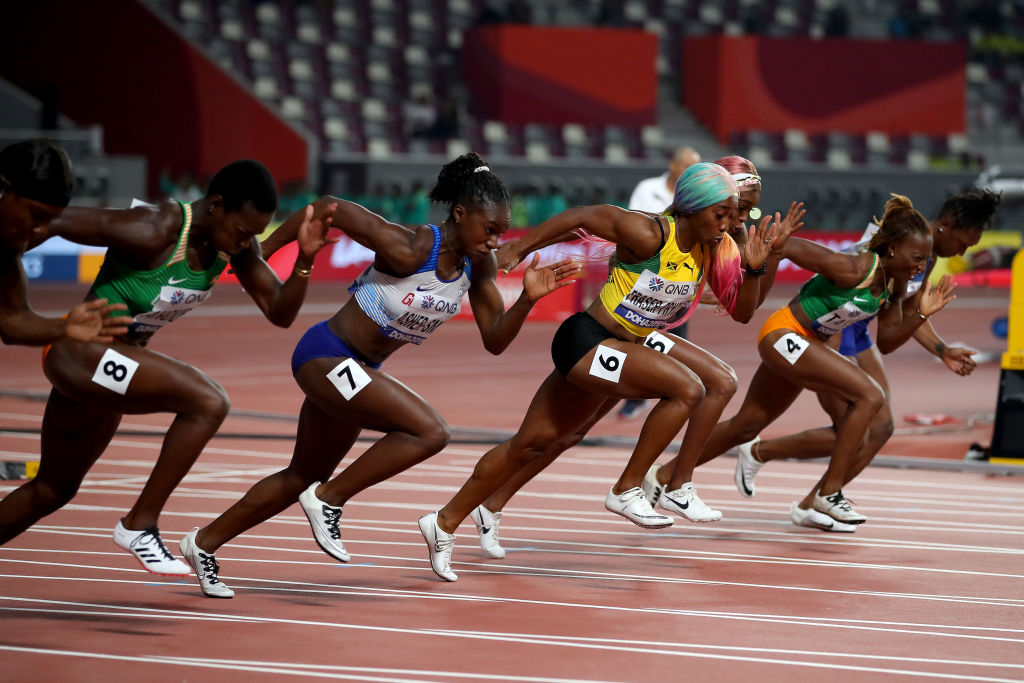The Women's 100m Final is one of the most anticipated events in athletics, showcasing the pinnacle of speed, endurance, and athletic prowess. This thrilling race captures the attention of millions around the world, as elite female sprinters battle it out on the track for glory, medals, and personal bests. In this article, we will delve into the history, significance, and the athletes that have made the Women's 100m Final a highlight of major sporting events.
From the Olympic Games to World Championships, the Women's 100m Final is a stage where legends are born and records are shattered. The electrifying atmosphere, intense competition, and the promise of breathtaking performances make this event a must-watch for sports enthusiasts. In this comprehensive guide, we will explore various aspects of the Women's 100m Final, including its historical context, notable athletes, and the science behind sprinting.
As we navigate through this article, you will gain insights into the intricacies of this fast-paced event, the training regimens of the athletes, and the milestones that have defined the Women's 100m Final over the years. Whether you are a seasoned track and field fan or a casual observer, this guide will equip you with all the information you need about one of the crown jewels of athletics.
Table of Contents
- 1. History of the Women's 100m Final
- 2. Significance of the Race
- 3. Notable Athletes in Women's 100m
- 4. World Records in Women's 100m
- 5. Training and Preparation of Sprinters
- 6. Major Competitions Featuring the Women's 100m Final
- 7. The Future of Women's 100m Sprinting
- 8. Conclusion
1. History of the Women's 100m Final
The Women's 100m event has a rich history, dating back to its introduction in the early 20th century. The first recorded Women's 100m race took place at the 1928 Amsterdam Olympics, where women competed for the first time in track and field events. Since then, the Women's 100m Final has evolved, showcasing incredible talent and fierce competition.
Early Milestones
- The inaugural Olympic Women's 100m Final in 1928 was won by Dutch athlete Fanny Blankers-Koen.
- In 1932, American sprinter Helen Stephens became the first woman to win the Olympic title.
- The 1960 Rome Olympics marked the first time that women competed in the 100m Final with full media coverage.
2. Significance of the Race
The Women's 100m Final is significant not only for the athletes but also for the broader context of women's sports. It symbolizes the fight for gender equality in athletics and represents the breaking of barriers in a traditionally male-dominated arena.
Impact on Women's Sports
As one of the marquee events, the Women's 100m Final helps to elevate the visibility of female athletes, encouraging young girls to pursue sports. The performance of these sprinters inspires a new generation and fosters greater investment in women's athletics.
3. Notable Athletes in Women's 100m
Throughout the history of the Women's 100m Final, several athletes have stood out due to their exceptional talent and accomplishments. Here are some of the most notable figures:
| Name | Country | Achievements |
|---|---|---|
| Florence Griffith-Joyner | USA | World record holder, Olympic gold medalist (1988) |
| Marion Jones | USA | Three-time Olympic gold medalist (2000) |
| Shelly-Ann Fraser-Pryce | Jamaica | Two-time Olympic champion (2008, 2012) |
| Elaine Thompson-Herah | Jamaica | Two-time Olympic champion (2016, 2020) |
4. World Records in Women's 100m
The Women's 100m has seen remarkable performances and world records that have captivated fans globally. The current world record is held by Florence Griffith-Joyner, who clocked an astonishing time of 10.49 seconds in 1988. This record remains unbroken, showcasing the phenomenal nature of her achievement.
List of World Records
- 10.49 seconds - Florence Griffith-Joyner (USA) - 1988
- 10.61 seconds - Carmelita Jeter (USA) - 2009
- 10.64 seconds - Marion Jones (USA) - 1998
5. Training and Preparation of Sprinters
To compete at the highest level, female sprinters undergo rigorous training regimes that focus on speed, strength, and technique. Training typically includes:
- Speed drills to enhance acceleration and top speed.
- Strength training to build muscle power and endurance.
- Technical workouts focusing on starts, transitions, and finishes.
- Nutrition and recovery strategies to maintain peak performance.
6. Major Competitions Featuring the Women's 100m Final
The Women's 100m Final is a highlight of numerous prestigious competitions, including:
- Olympic Games
- IAAF World Championships
- Diamond League Meetings
- Continental Championships
7. The Future of Women's 100m Sprinting
As we look to the future, the Women's 100m Final is poised to continue its legacy of excellence. Emerging talents from around the world are setting new benchmarks and raising the level of competition. With advancements in training, technology, and increased support for female athletes, we can expect to see even more thrilling races and records in the years to come.
8. Conclusion
In summary, the Women's 100m Final is not just a race; it is a celebration of speed, strength, and resilience. With its rich history, significant impact on women's sports, and the incredible athletes who have graced the track, this event remains a cornerstone of athletics. We invite you to engage with this vibrant community by leaving comments, sharing your thoughts, and exploring more articles on our site.
Thank you for reading, and we look forward to bringing you more insights into the world of athletics!


